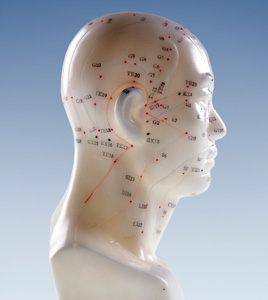 A few weeks ago, I asked for your most pressing acupuncture questions. I’ve compiled the most common questions and I noticed one distinct trend—there are a lot of questions about the needles. Some of you must be nervous about getting needled!
A few weeks ago, I asked for your most pressing acupuncture questions. I’ve compiled the most common questions and I noticed one distinct trend—there are a lot of questions about the needles. Some of you must be nervous about getting needled!
If these acupuncture answers don’t put your fears to rest, call me for more information. Acupuncture brings good health, relaxation and vitality. I don’t want fear to stop you from getting treatment.
Do acupuncture needles hurt?
This question is always a little tricky because it depends on what you mean by “hurt.”
Acupuncture needles do not feel like getting a shot. Unlike hypodermic needles, acupuncture needles are thin, tiny and flexible. They are not inserted deeply.
However, you might feel something. Sometimes you may feel a prick—like getting a mosquito bite. You may feel tingling or fullness when I adjust the needles. But in most cases, you’ll forget about the needles as you rest on the table.
Are there any side-effects from acupuncture?
There are rarely side-effects from acupuncture. Sometimes there may be bruising or soreness, especially if you have a cupping or Gua Sha. Or you may feel light-headed or ungrounded after a session. Occasionally there is an emotional release.
When people complain of worsening symptoms or fatigue from acupuncture, often it is actually a sign of healing. If your Qi has been blocked, it can cause uncomfortable symptoms as it resumes flowing. To understand this, imagine a garden hose with a kink in it. The kink stops the water from flowing; when you straighten it out, the water bursts out of the hose before it begins flowing normally again. Qi behaves the same way.
If you notice your symptoms getting worse after a treatment, contact me. I can suggest ways to reduce your discomfort and speed your healing.
Is acupuncture a placebo?
This is a hotly contested question in the scientific community. Periodically a new study comes out, proving or disproving acupuncture.
Of course, I don’t think acupuncture is a placebo. I have seen acupuncture work on many patients and I’ve seen extraordinary results. I have no doubt about its efficacy and confidently recommend it to everyone.
But research has mixed results and it’s hard to weed through all the studies to come to a conclusion. Many studies about acupuncture are poorly designed with too small a sample or subjective results. Some studies focus on acupuncture for a single disease or condition and don’t translate their findings into broad conclusions. And of course, “acupuncture” is a broad term describing many techniques and many styles of practice. It’s hard to study all the variations.
One big stumbling block to proving that acupuncture works is that western science doesn’t understand how it works. There are many theories but none of them cover all the effects of acupuncture all of the time. Since scientists can’t figure it out, they continue to question if it really exists.
I think the biggest question to ask yourself is if you have seen results. Does acupuncture work for you? Do you feel better after an appointment?
Why do you turn the needles?
Turning the needles helps them work more effectively. It both helps move Qi and tells me if the Qi has started to move.
Can you poke through my organs?
No, I will not poke through any organs other than your skin. Acupuncture needles are very thin and tiny, and are only inserted skin-deep.
However if you Google this topic, you will find alarming articles which claim that acupuncture can lead to lung collapse. Many of these articles refer to a study by the National Health Service (NHS) in the UK, which found some cases of pneumothorax (collapsed lung) caused by acupuncture.
I don’t know the details of these cases but they are very surprising. It’s hard to imagine a situation where a well-trained acupuncturist would puncture a lung. And it’s interesting to note that the NHS (the source of the study) concludes that acupuncture is a “low harm” treatment. The NHS notes that these cases are very, very rare compared to the millions of acupuncture treatments each year.
If you are really concerned about the health risks of acupuncture, contact me. Let’s talk. I will answer all of your questions openly and honestly so you can make an informed choice.
Will acupuncture needles make me bleed?
Generally, no. Sometimes there is a tiny droplet of blood but it is easily wiped away with a cotton ball. Acupuncture needles are very fine.
Can you treat young kids?
Acupuncture is effective for all ages, all stages of life, from babies to the elderly. I welcome kids and have found some kids respond even more quickly to treatment than adults.
Does acupuncture help ______________?
I get all sorts of questions about what acupuncture can help. Can it treat infertility? Does it help turn a breech baby? Will it help me stop smoking?
Instead of answering each question individually, I’ll share a list of the types of conditions it helps. If you don’t see your condition answered here, call me. This list is not comprehensive.
- Abdominal pain
- Addictions
- Arthritis
- Allergies
- Cancer pain
- Chronic gastritis
- Depression
- Diabetes
- Menstrual issues
- Earache
- Infertility
- Fibromyalgia
- Headache
- Herpes
- Hypertension
- Insomnia
- Knee pain
- Low back pain
- Morning sickness
- Nausea & vomiting
- Neck pain
- Obesity
- Post-operative pain
- Pregnancy issues
- Premenstrual syndrome
- Sciatica
- Sore throat
- Sprains
- Stress
- Strokes
- TMJ
- Tennis elbow

